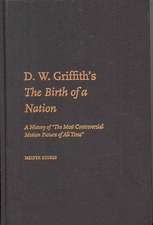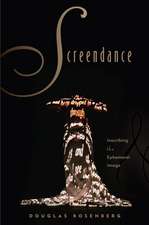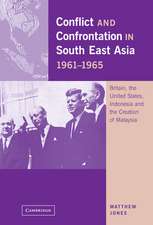Cinema Memories: A People's History of Cinema-going in 1960s Britain
Autor Melvyn Stokes, Matthew Jones, Emma Petten Limba Engleză Paperback – 20 sep 2023
| Toate formatele și edițiile | Preț | Express |
|---|---|---|
| Paperback (1) | 189.02 lei 3-5 săpt. | +74.95 lei 4-10 zile |
| Bloomsbury Publishing – 20 sep 2023 | 189.02 lei 3-5 săpt. | +74.95 lei 4-10 zile |
| Hardback (1) | 542.43 lei 3-5 săpt. | |
| Bloomsbury Publishing – 6 apr 2022 | 542.43 lei 3-5 săpt. |
Preț: 189.02 lei
Preț vechi: 243.05 lei
-22% Nou
Puncte Express: 284
Preț estimativ în valută:
36.17€ • 37.63$ • 29.86£
36.17€ • 37.63$ • 29.86£
Carte disponibilă
Livrare economică 24 martie-07 aprilie
Livrare express 07-13 martie pentru 84.94 lei
Preluare comenzi: 021 569.72.76
Specificații
ISBN-13: 9781839025297
ISBN-10: 1839025298
Pagini: 256
Ilustrații: 10 bw illus
Dimensiuni: 156 x 234 x 25 mm
Greutate: 0.54 kg
Editura: Bloomsbury Publishing
Colecția British Film Institute
Locul publicării:London, United Kingdom
ISBN-10: 1839025298
Pagini: 256
Ilustrații: 10 bw illus
Dimensiuni: 156 x 234 x 25 mm
Greutate: 0.54 kg
Editura: Bloomsbury Publishing
Colecția British Film Institute
Locul publicării:London, United Kingdom
Caracteristici
Drawing on first-hand oral history, Screen Memories provides a unique insight into what it was like to go to the cinema in the 1960s.
Notă biografică
Melvyn Stokes is Professor of Film History at University College London, UK. He is the author and editor of books including Charlot: How the French Discovered, Wrote About, Defended and Resurrected Charlie Chaplin (Oxford University Press, 2018); Cinéma et mémoire dans le cinéma Anglophone/Memory in-of English-speaking Cinema, ed. (with Z. Saleh) (Michel Houdiard, 2014); American History through Hollywood Film (Bloomsbury, December 2013); Gilda (BFI Film Classics, 2010); Cinéma et histoire/Cinema and History, ed. (with G. Menegaldo) (Michel Houdiard, 2008); D.W. Griffith's "The Birth of a Nation": A History of "the Most Controversial Motion Picture of All Time" (Oxford University Press, 2007); Going to the Movies: Hollywood and the Social Experience of Cinema, ed. (with R. Maltby and R. C. Allen) (University of Exeter Press, 2007); and Hollywood Abroad: Audiences and Cultural Exchange, ed. (with R. Maltby) (British Film Institute, 2004). Matthew Jones is Senior Lecturer in Cinema and Television History, De Montfort University, UK. He is the author of Science Fiction Cinema and 1950s Britain (Bloomsbury, 2017).Emma Pett is Lecturer in Film Consumption at the University of East Anglia, UK. She has published articles in journals including The Journal of British Cinema and Television and in edited books.
Cuprins
Introduction1. 'This is where we came in': cinema-going in the sixties2. Sex and the Cinema3. 'The times they are a-changin'?: American Sixties Films 4. Reflecting 'what life was like'?: British films of the 1960s 5. 'New Waves' from Europe6. Postcolonial Audiences7. Conclusion
Recenzii
This research is an excellent reminder of the importance of the cinema experience in that culturally significant decade . and it also serves to point out just how much has changed over the last fifty years . [The book] may provoke nostalgia in some older readers, whilst for younger readers it's a fascinating window into an almost lost world.
Cinema Memories paints a fascinating portrait of the place of cinema in the lives and imaginations of its British audiences in the 1960s. Based on an extensive collection of interviews and questionnaires, it makes a vivid contribution both to the social history of the period and to the rapidly developing field of memory studies.
Cinema Memories maps exciting and accessible new routes through the spaces and places of 1960s cinema and social history in Britain. It deftly connects New Cinema History's methodological emphasis on empirical contexts of cinema-going and film reception with intellectual traditions grounded in British Cultural Studies and People's History.
Cinema Memories paints a fascinating portrait of the place of cinema in the lives and imaginations of its British audiences in the 1960s. Based on an extensive collection of interviews and questionnaires, it makes a vivid contribution both to the social history of the period and to the rapidly developing field of memory studies.
Cinema Memories maps exciting and accessible new routes through the spaces and places of 1960s cinema and social history in Britain. It deftly connects New Cinema History's methodological emphasis on empirical contexts of cinema-going and film reception with intellectual traditions grounded in British Cultural Studies and People's History.





















